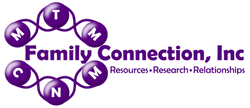|
Audentes Therapeutics is conducting a survey to gather important data related to the Quality of Life & Economic Impacts of XLMTM. The results of this survey will be published and shared with the XLMTM community, and could be shared with health policy makers and insurance companies to support patient access to future treatments. Initially the survey is live for US-based families, with UK and German versions coming soon. They have asked us, along with other patient advocacy organizations, to help share the following information: Family and Caregiver Economic and Quality of Life Impact of XLMTM Study
Audentes Therapeutics, Inc. recently hired Precision Xtract, an independent consulting company specializing in conducting health outcomes studies, to field a non-interventional (meaning no investigational product is given) study of parents and caregivers of children with XLMTM. This study will collect information about the experiences of XLMTM families and other caregivers in caring for XLMTM patients via an anonymous, internet-based survey. Parents and caregivers of XLMTM patients that are living or that have passed are eligible to participate. The goal of this study is to create a more thorough understanding of the quality of life and economic impact of XLMTM on families and caregivers. Upon completion of the study, the results will be published and shared with the XLMTM community. In addition, summary results could be shared in the future with health policy makers and insurance companies to support patient access to potential treatments. If you are interested in participating, please follow the link at the bottom of this page. More detailed information about the study, who is eligible to complete the survey and important privacy and consent information are available via this link. Your privacy, and that of your child, is of the highest consideration for the conduct of this study and the sharing of its results. At no time will your child’s identity, your identity, or any individual patient or caregiver information be shared publicly, or in any way that can be directly linked to you or your child. Since you all lead very busy lives, the survey is designed so that it may be started and paused so that it may be completed in multiple sessions, if desired. The entire survey is intended to take no more than one hour in total time to complete. Your support of this study is much appreciated and will provide important insights on the quality of life and economic aspects of XLMTM. CLICK HERE FOR LINK TO SURVEY ***Update 11/26 regarding mobile access to the survey*** The Issue: We have heard that individuals using mobile devices and tablets (or do not have access to the spreadsheet application), have had challenges in completing the study, specifically the EQ-5D portion.
The Solution: We have reprogrammed the study so that it can be completed on mobile devices (in addition to laptop and desktop computers).
2 Comments
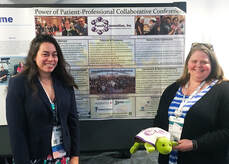 In September, Erin and Marie (and Myo!) traveled to San Diego for the 2019 RARE Patient Advocacy Summit put on by Global Genes. We represented our MTM-CNM community and gave a Poster Presentation entitled "Power of Patient-Professional Collaborative Conferences", sharing some unique features of our Conference model, and helping to inspire others interested in similar collaborative efforts. Put simply, our conference is not just about families or just about research. It is about bringing all together - families, researchers, medical professionals, pharma industry - and creating an experience that is truly greater than the sum of its parts and moves our community forward together. Check out the poster below! By Mark Ward, MTM-CNM Family Connection You may have seen some news recently about Zolgensma, a gene therapy that just got approval from the FDA for use in patients with Type 1 Spinal Muscular Atrophy (SMA). It’s disappointing, but not surprising, that most of the headlines are exclaiming the cost of the treatment ($2.1 million). Consumer news sources and media are trying to get your attention, and usually amplify the hype without necessarily providing much actual insight. Here are a few thoughts to consider, especially when extrapolating to gene therapy or similar for MTM/CNM…
1) Type 1 SMA is an early-onset, relatively rapid progression that irreversibly destroys the motor neurons. After about age 2 the damage is severe, requiring extensive intervention and support and generally fatal over time, though supportive technology such as mechanical ventilation can help, much like with MTM. This gene therapy stops the progression of SMA, but cannot undo damage that has been done. Therefore, the approval today was only for patients under age 2. This underscores the importance of early accurate genetic diagnosis. MTM, in contrast, generally does not destroy the muscle tissue over time. Rather, the missing myotubularin acts a bit like a “key” that unlocks the existing muscle machinery. While it is yet to be proven in human patients, it is hoped that all age ranges would benefit from gene therapy for MTM. Importantly though, there are other long-term effects of lack of muscle strength, such as joint contractures, that may be more challenging to address in older patients even if muscle strength was restored. 2) Novartis has estimated the cost of medical care for someone with SMA to be about $4M for a span of 10 years. From an insurance/payers perspective, the $2.1M “price tag” for the gene therapy should be understood relative to the expected benefits. It is a single-dose treatment, one and done. If administered early enough (aka under 2 years old) it is reasonable to expect that the $4M in costs are avoided, hence a “savings” of about $2M over 10 years. Note – this can start to sound like putting a value on a human life, which is an abhorrent concept, but it really is just about setting a reasonable price for the drug, compared to the costs of alternative care. Steven Pearson, President of the Institute for Clinical and Economic Review (ICER) said, “Insurers were going to cover Zolgensma no matter the price, and Novartis has spoken publicly about considering prices that approached $5 million. It is a positive outcome for patients and the entire health system that Novartis instead chose to price Zolgensma at a level that more fairly aligns with the benefits for these children and their families.” 3) Novartis is offering insurers a payment plan ($425K per year for 5 years), which is an attempt to address the real challenge of how to pay for a treatment like this that is so different from just about any other medical treatment available today. As the field of gene therapy progresses, these types of alternative payment models will be needed, and this is an area of much work for shaping new public policy and legislation. The patient & family voice is needed here as well! 4) The development of a gene therapy product takes several years and many many millions of dollars. The sponsoring company has to foot the bill – often underwritten by investors, private or public, who take on the financial risk given that most drug development efforts never get approved. The first Phase 1 clinical trial for Zolgensma (called AVXS-101 at the time) began in 2014, so that is about 5 years worth of expensive clinical trials and other development, manufacturing, and regulatory activities (not to mention pre-clinical work) without a single penny in sales. Eventually, these development costs need to be paid back by successfully marketing a product. For MTM, Audentes initiated their Phase 1/2 clinical trial “ASPIRO” with the first patient dosed in September 2017, about 1.5 years ago. While each development timeline and approval pathway is unique and we can’t really connect SMA and MTM, it is generally an encouraging sign that the FDA has granted approval for Zolgensma, and that a novel payment approach is being implemented. We can certainly continue to hope that the data published so far for ASPIRO will be reinforced by future positive results, leading to expedited approval and access for all who need it.  As potential treatments for rare diseases such as XLMTM are being developed, it is essential that when and if they are approved for clinical use that they will also be accessible by all the patients that need them. Current pricing and reimbursement models would be a major obstacle, especially for single-dose treatments that have cost hundreds of millions of dollars to develop. U.S. Senator Bill Cassidy, M.D. (R-LA), and Senator Mark Warner (D-VA) on Jan. 29th released a draft version of the Patient Affordability, Value and Efficiency Act. This bipartisan legislation aims to facilitate new and innovative payment models for pharmaceuticals and other medical services so that patients have better access to treatment, the health care market is more efficient, and drug prices are more affordable. The Cassidy-Warner proposal increases the ability to move toward value-based payment, which directly connect pricing for prescription drugs and medical devices to their clinical effectiveness. MTM-CNM Family Connection was pleased to join several patient advocacy groups in signing a letter of support for Cassidy & Warner’s efforts. Read the letter attached below, and the press release at www.cassidy.senate.gov/newsroom/press-releases/cassidy-warner-unveil-draft-legislation-to-lower-drug-prices-through-innovative-payment-models. 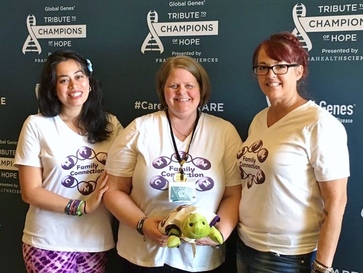 Marie, Erin, Shannon, and Myo representing MTM-CNM Family Connection at Global Genes 2016 RARE Patient Advocacy Summit in Huntington Beach, CA Marie, Erin, Shannon, and Myo representing MTM-CNM Family Connection at Global Genes 2016 RARE Patient Advocacy Summit in Huntington Beach, CA Members of our MTM-CNM Family Connection Team recently attended the 2016 RARE Patient Advocacy Summit, hosted by Global Genes, September 20th & 21st in Huntington Beach, CA. With the beautiful backdrop of palm trees and the Pacific Ocean and in an atmosphere of innovation, energy, and alliance, patient advocates from the greater RARE disease community came together to learn from each other and from the scientists, researchers, philanthropists, artists, and others working hard to support and spread awareness on behalf of our communities. One of the primary takeaways from this conference was that although each individual rare disease community is small, there are over 7,000 identified rare diseases with millions being affected. That means almost everyone, whether aware of it or not, knows someone RARE. Sadly, only 5% of these diseases currently have an FDA-approved treatment. However, this is where the cumulative power of RARE can make a difference, and Global Genes has really stepped up to the plate in providing support and learning opportunities for everyone at every stage by leveraging the strengths of each community's advocates. During breakout sessions, RARE advocates who had succeeded in particular areas, such as community building, establishing advisory boards, fundraising, soliciting volunteers, utilizing social media to spread awareness, coordinating longitudinal studies, and pushing forward on the path of clinical trials, eagerly shared what had worked and what had not, often opening up the floor for feedback and participation. The roles of teacher and learner were fluid and dynamic as advocates spoke to their strengths and then sought mentorship in areas needing to grow. So speakers in one round of breakouts would be audience participants in the next round. For us, it was valuable to glean knowledge and insights from other communities that are further along in clinical trials, and we were happy to share our expertise with other rare disease groups that are just getting off the ground or planning their first family conference. The conference presentations were informational, the spirit of collaboration palpable, and the universal commitment to work until all rare diseases are curable, undeniable! Galvanized by this positive, exhilarating experience, we came away more committed than ever to continue in our mission to connect MTM & CNM families to essential resources, active research, and life-enhancing relationships!
Myo, our MTM-CNM Traveling Turtle, also made the trip and made his rounds at the summit, meeting patients, family members, researchers, pharma industry and government agency leaders. We had an opportunity to share with other patient groups how Myo travels around the world with the goal of connecting our community and spreading awareness of MTM & CNM. Myo was happy to meet some new friends and also did some advocacy work as well, supporting the #CURESNOW campaign through social media.
|
MTM-CNM Family Connection's Blog
Sharing information, resources, updates, and thoughts on various topics of interest to the MTM-CNM community. Archives
July 2020
Categories
All
|
|
Copyright 2014-2022 MTM-CNM Family Connection, Inc
|
|
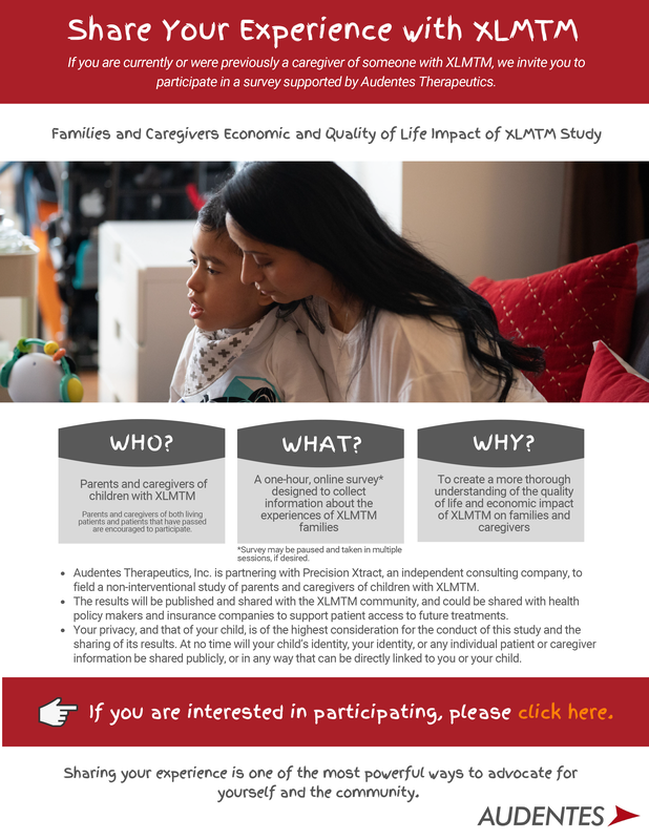
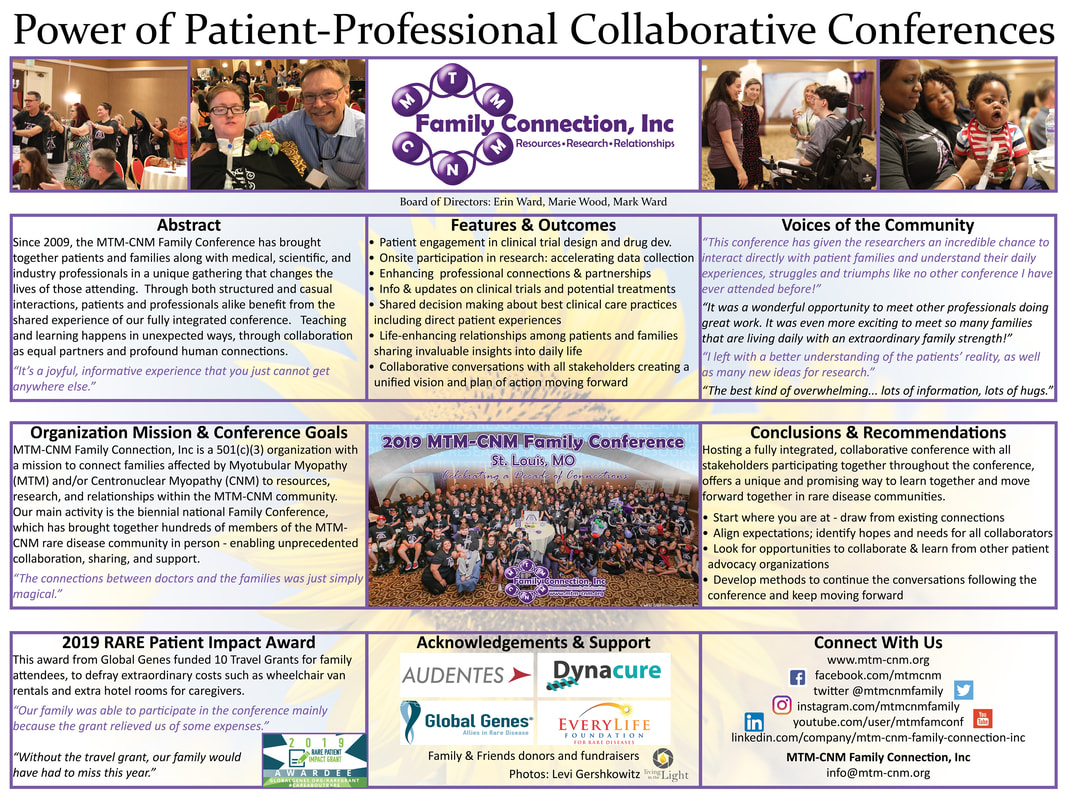
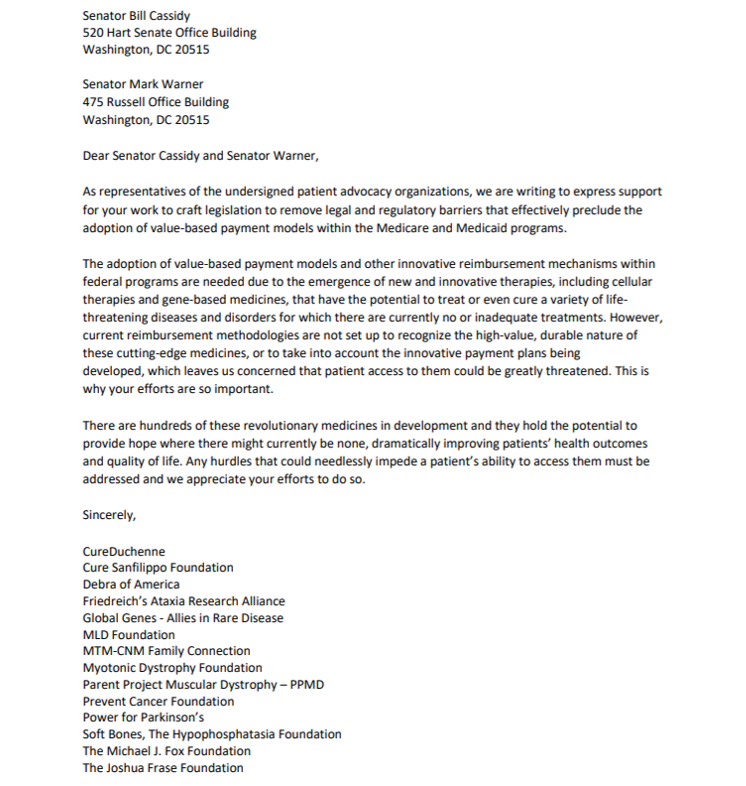
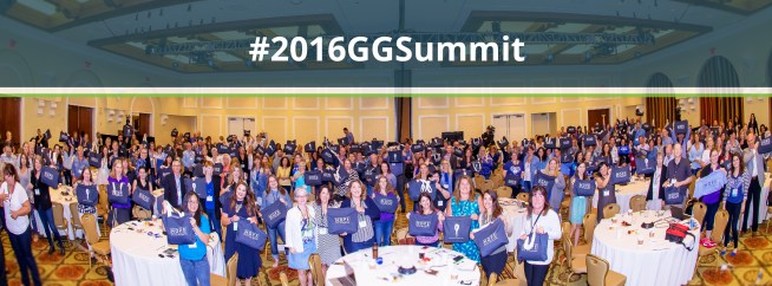
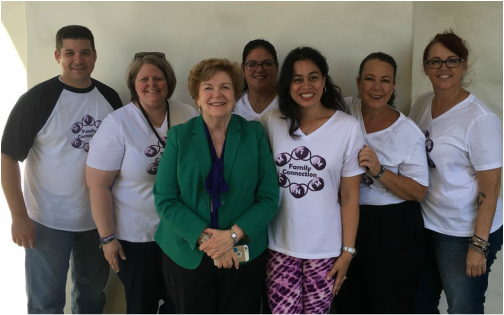



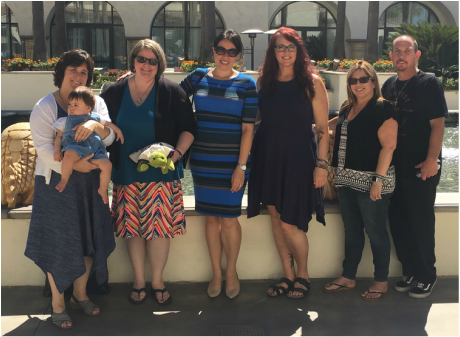
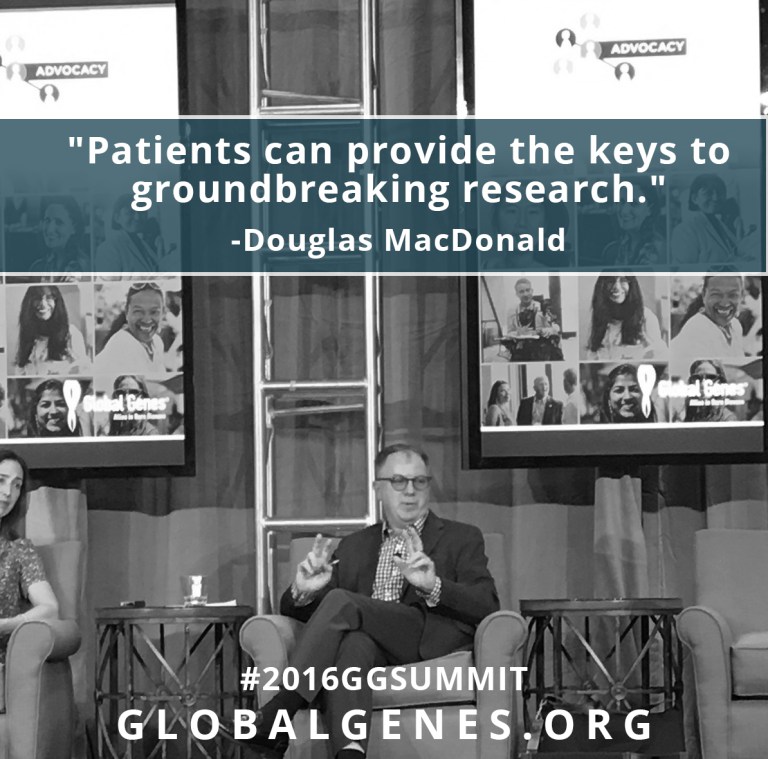
 RSS Feed
RSS Feed
